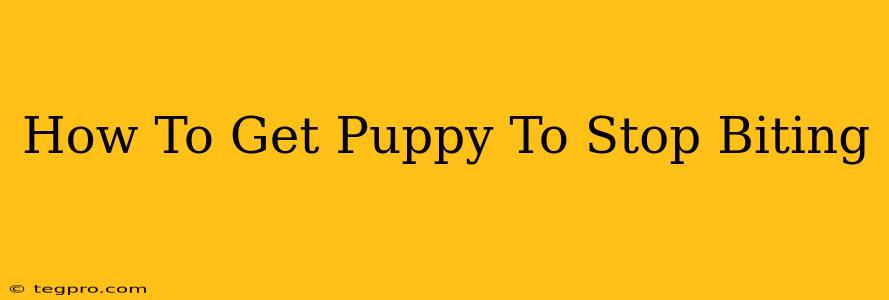Bringing a new puppy home is an exciting time, filled with playful cuddles and adorable antics. However, puppy biting can quickly become a frustrating and even painful experience for new owners. Understanding why puppies bite and employing effective training techniques is crucial to curb this behavior and build a strong, positive relationship with your furry friend. This comprehensive guide will equip you with the tools and knowledge to successfully manage your puppy's biting habit.
Understanding Puppy Biting: Why Does My Puppy Bite?
Puppies bite for several reasons, many of which are perfectly normal developmental stages:
- Teething: Like human babies, puppies experience teething pain and instinctively gnaw on things to relieve discomfort.
- Exploration: Puppies explore the world through their mouths, using their teeth to investigate textures, objects, and even people.
- Play: Rough play with littermates often involves nipping and biting, a normal part of canine socialization.
- Excitement/Over-stimulation: A highly energetic puppy might bite out of sheer excitement or when overstimulated.
- Fear/Anxiety: In some cases, biting can be a sign of fear or anxiety, particularly if the puppy feels threatened or cornered.
Effective Strategies to Stop Puppy Biting
The key to stopping puppy biting lies in consistency, patience, and positive reinforcement. Here are several proven strategies:
1. Puppy-Proof Your Home
Minimizing opportunities for biting is the first step. Puppy-proof your home by removing tempting items like electrical cords, shoes, and anything easily destroyed. Provide plenty of appropriate chew toys to satisfy your puppy's natural gnawing instincts.
2. Supervise Your Puppy Constantly
Never leave your puppy unsupervised, especially during playtime. Constant supervision allows you to immediately intervene when biting occurs.
3. Teach Bite Inhibition
This is crucial. When your puppy bites, immediately stop playing and give a high-pitched yelp, mimicking a pup's pain cry. Then, ignore the puppy for a few seconds before resuming play only if the biting stops. This teaches your puppy that biting ends the fun.
4. Redirect to Chew Toys
If your puppy starts nipping, calmly redirect their attention to an appropriate chew toy. Offer praise and reward when they chew the toy instead of you.
5. Positive Reinforcement Training
Reward good behavior with treats, praise, and affection. When your puppy is calm and gentle, shower them with positive reinforcement. This strengthens the desired behavior.
6. Time-Outs
If your puppy bites aggressively, a brief time-out in a quiet area can be effective. This isn't punishment; it's a break to help your puppy calm down.
7. Socialization
Proper socialization is vital. Expose your puppy to various sights, sounds, and people in a controlled and positive manner. This helps reduce fear-based biting.
8. Seek Professional Help
If biting persists despite your efforts, consider seeking guidance from a certified professional dog trainer or veterinarian. They can assess the situation and offer tailored advice or address underlying issues.
Preventing Future Biting Issues
- Start early: Begin training bite inhibition from the moment you bring your puppy home.
- Consistency is key: Everyone in the household must follow the same training methods.
- Patience and understanding: Puppy biting is a normal behavior that takes time and patience to correct.
- Positive reinforcement: Focus on rewarding good behavior rather than punishing bad behavior.
By understanding the reasons behind puppy biting and implementing these effective strategies, you can successfully guide your puppy towards a gentler, more well-behaved companion. Remember that consistency and positive reinforcement are your best allies in this journey. With patience and dedication, you can transform your nipping puppy into a loving and well-adjusted member of your family.

